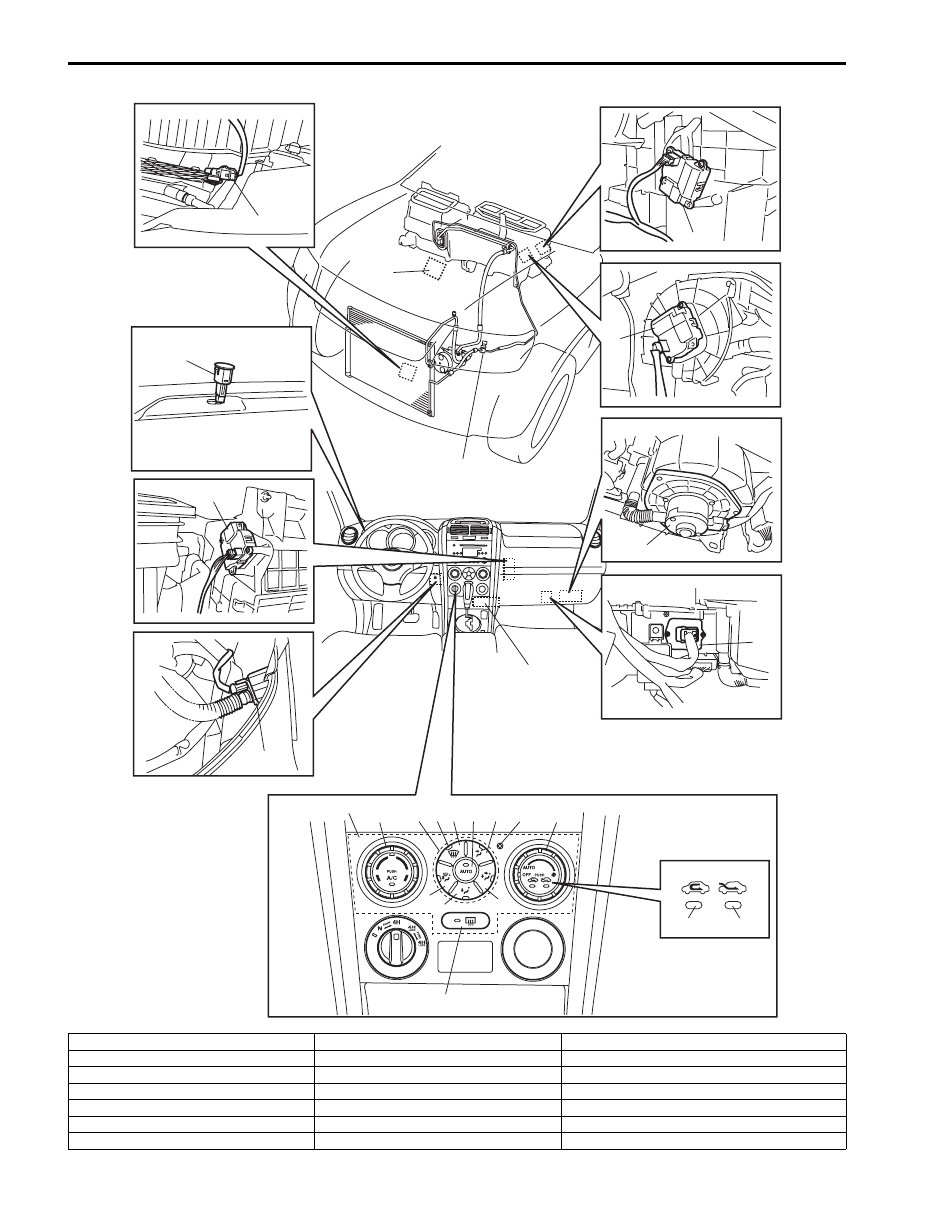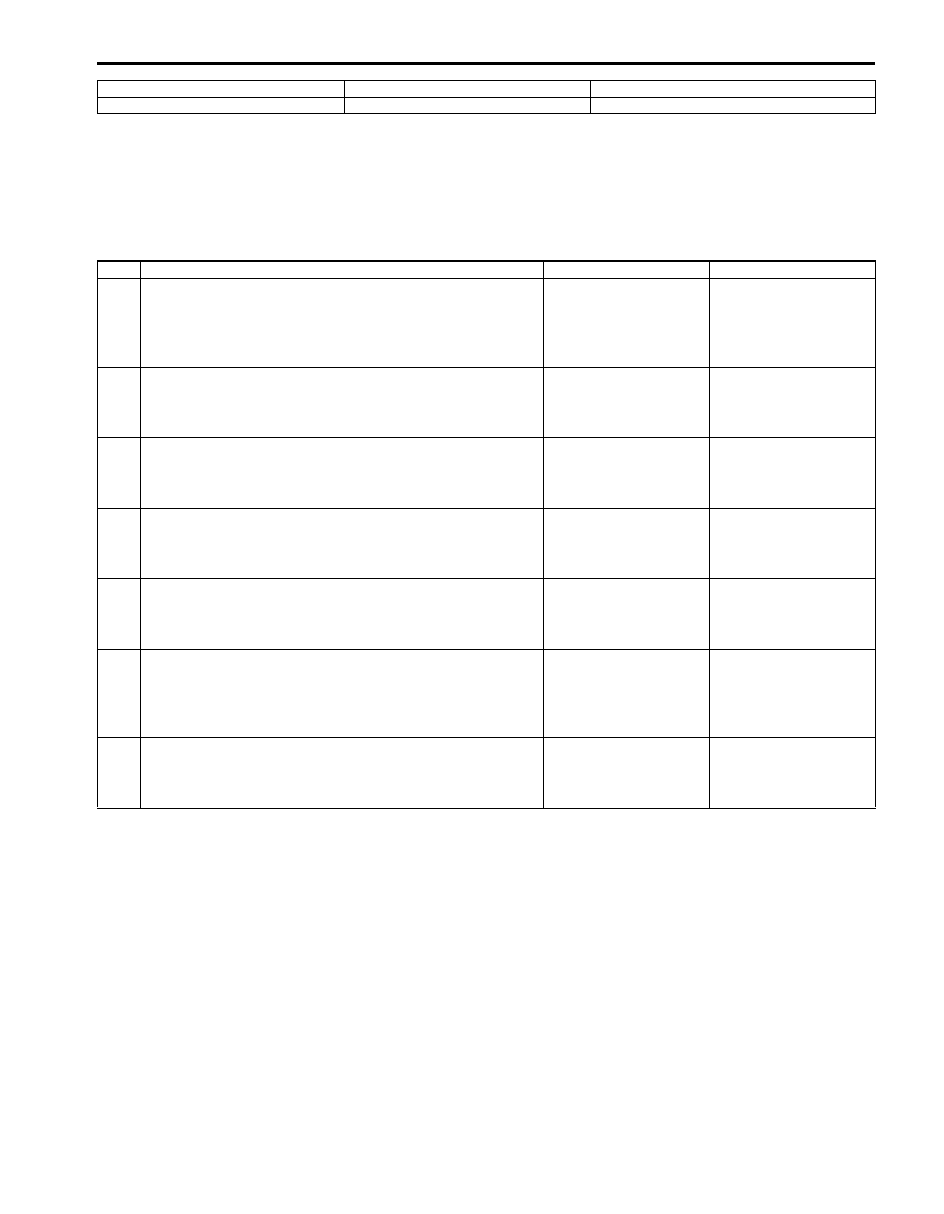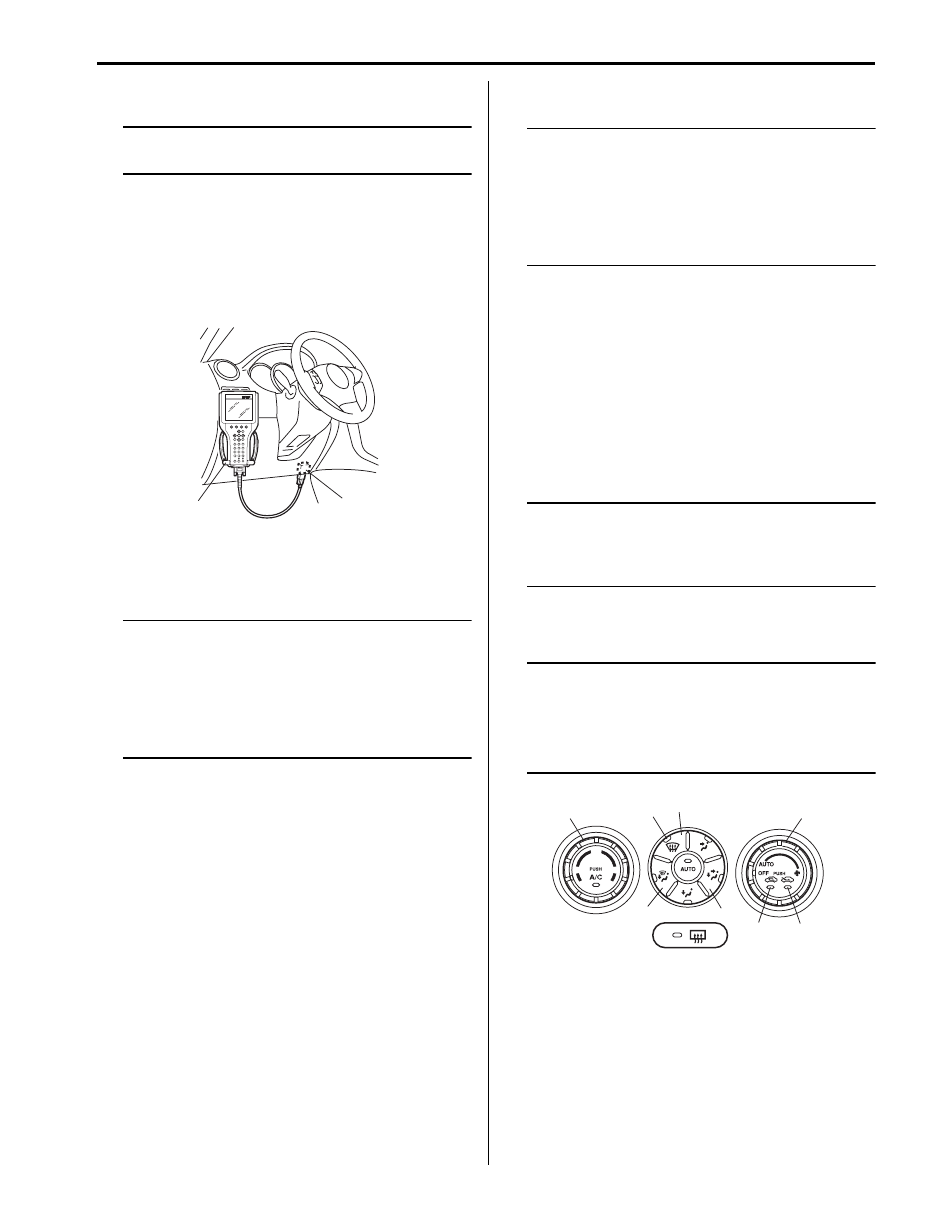Suzuki Grand Vitara JB416 / JB420. Manual — part 280

7B-11 Air Conditioning System:
1
*2
*7
*3
*6
*11
*10
9
8
4
5
25
12
24 26
14
22
23
16
15
21
13
17
19
18
20
I5JB0A720009-07
1. Outside temperature sensor
10. Blower motor
19. Theft deterrent light
2. Sunload sensor
11. Blower motor controller
20. Blower speed selector / Air intake selector
3. Inside temperature sensor
12. Temperature selector / A/C switch
21. Rear defogger switch
4. ECT sensor
13. “DEF” switch
22. “REC” indicator lamp
5. Refrigerant pressure sensor
14. “DEF / FOOT” switch
23. “FRE” indicator lamp
6. Evaporator temperature sensor
15. “FOOT” switch
24. MODE selector
7. Air intake control actuator
16. “BI-LEVEL” switch
25. HVAC control module (vehicle with A/C)

Air Conditioning System: 7B-12
Diagnostic Information and Procedures
Air Conditioning System Check
S5JB0A7204007
To ensure that system diagnosis is done accurately and smoothly, read “Precautions in Diagnosing Trouble” and follow
“Air Conditioning System Check”.
8. Temperature control actuator
17. “VENT” switch
26. “DEF” indicator lamp
9. Air flow control actuator
18. “AUTO” switch
Step
Action
Yes
No
1
Customer complaint analysis
1) Perform “Customer Complaint Analysis”.
Was customer complaint analysis performed according to
instruction?
Go to Step 2.
Perform customer
complaint analysis.
2
Visual inspection
1) Perform “Visual Inspection”.
Is there any faulty condition?
Repair or replace
malfunction part.
Go to Step 3.
3
DTC check
1) Perform “DTC Check”.
Is it malfunction code?
Go to Step 4.
Go to Step 5.
4
Troubleshooting for DTC
1) Check and repair according to DTC diag. flow.
Are check and repair completed?
Go to Step 7.
Check and repair
malfunction part(s).
5
Check for intermittent problem
1) Check for intermittent problem.
Is there faulty condition?
Repair or replace
malfunction part(s).
Go to Step 6.
6
Air conditioning system symptom diagnosis
1) Inspect and repair referring to “A/C System Symptom
Are inspect and repair complete?
Go to Step 7.
Inspect and repair
malfunction part(s).
7
Final confirmation test
1) Perform DTC check.
Is there any DTC?
Go to Step 4.
Air Conditioning system
is good condition.

7B-13 Air Conditioning System:
Customer Complaint Analysis
Record details of the problem (failure, complaint) and how it occurred as described by the customer.
For this purpose, use of such a questionnaire form as shown in the figure will facilitate collecting information to the
point required for proper analysis and diagnosis.
Customer questionnaire (example)
NOTE
The form is a standard sample. It should be modified according to conditions characteristic of each
market.
Visual Inspection
As a preliminary step, be sure to perform visual check of the items that support proper function of the air conditioning
system referring to “Visual Inspection”.
DTC Check
Refer to “DTC Check” for checking procedure.
Troubleshooting for DTC
Based on the DTC indicated in Step 4 and referring to applicable DTC flow, locate the cause of the trouble, namely in
a sensor, actuator, wire harness, connector, HVAC control module or other part and repair or replace faulty parts.
Check for Intermittent Problem
Check parts where an intermittent trouble is easy to occur (e.g., wire harness, connector, etc.), referring to
“Intermittent and Poor Connection Inspection in Section 00”.
Air Conditioning System Symptom Diagnosis
Check the parts or system suspected as a possible cause referring to “A/C System Symptom Diagnosis”.
Final Confirmation Test
Confirm that the problem symptom has gone and the air conditioning system is free from any abnormal conditions. If
what has been repaired is related to the malfunction DTC, check DTC once and confirm that no DTC is indicated.
Customer’s Name:
Model:
VIN:
Date of Issue:
Date Reg.
Date of Problem:
Mileage:
Problem Symptoms
• “FRE” indicator lamp abnormal: fails to turn ON / fails to go OFF / flashes
• Abnormal noise while “A/C” switch is turned ON: from compressor, from radiator fan
motor, other_______________
• Cool air does not come out:
• Radiator fan motor does not work:
• A/C compressor does not work:
• Blower fan motor does not work:
Frequency of Occurrence
• Continuous / Intermittent (_____ times a day, a month) / other_______________
Conditions for Occurrence of
Problem
• Vehicle at stop & A/C compressor is working:
• For some time after A/C switch is ON:
• When outside air temperature is high:
• When outside air temperature is low:
• All the time:
Environmental Condition
• Weather: fair / cloudy / rain / snow / other_______________
• Temperature: _____
°F (_____ °C)
DTC
• First check: Normal code / malfunction code (__________)
• Second check: Normal code / malfunction code (__________)

Air Conditioning System: 7B-14
DTC Check
S5JB0A7204028
NOTE
To know how to use SUZUKI scan tool in
detail, refer to its operator’s manual.
Using SUZUKI Scan Tool
1) Turn ignition switch to OFF position.
2) Connect SUZUKI scan tool to data link connector
(DLC) (1) located on underside of instrument panel.
Special tool
(A): SUZUKI scan tool
3) Apply light to sunload sensor vertically, holding
incandescent lamp of approximately 100 W about
100 mm (3.94 in.) away from sunload sensor.
NOTE
If B1504 is detected when vehicle is not
exposed to light (indoor, etc.), check again
for DTC with light from incandescent lamp
applied to sunload sensor, referring to
“Sunload Sensor Inspection”. If B1504 is not
detected in this check, sunload sensor is in
good condition.
4) Turn ignition switch to ON position.
5) Read DTC according to instructions displayed on
SUZUKI scan tool and print it or write it down. Refer
to SUZUKI scan tool operator’s manual for further
details.
If communication between scan tool and ECM
(PCM) is not possible, check if scan tool is
communicable by connecting it to ECM (PCM) in
another vehicle. If communication is possible in this
case, scan tool is good condition. Then check data
link connector and serial data line (circuit) in the
vehicle with which communication was not possible.
6) After completing the check, turn ignition switch OFF
position and disconnect SUZUKI scan tool from data
link connector (DLC).
Not Using SUZUKI Scan Tool
NOTE
If B1504 is detected when vehicle is not
exposed to light (indoor, etc.), check again
for DTC with light from incandescent lamp
applied to sunload sensor, referring to
“Sunload Sensor Inspection”. If B1504 is not
detected in this check, sunload sensor is in
good condition.
1) Apply light to sunload sensor vertically, holding
incandescent lamp of approximately 100 W about
100 mm (3.94 in.) away from sunload sensor.
2) Set the following selectors to specified positions
respectively with turn ignition switch OFF.
• Temperature selector (1): max cool position
• Blower speed selector (2): “OFF” position
3) While pressing “B/L” (BI-LEVEL) switch (3) and “D/F”
(defogger foot) switch (4) simultaneously turn
ignition switch to ON position.
NOTE
For 15 seconds after ignition switch is turned
on, both “REC” indicator lamp and “FRE”
indicator lamp light for in-system trouble
check.
4) Read DTC from flashing pattern of “FRE” indicator
(5) and “REC” indicator (6) referring to “DTC Table”.
NOTE
• Pressing “DEF” switch (7) alternates
display of current DTC and history DTC.
• “DEF” indicator lamp (8) remains off when
display is in current DTC mode and it lights
up when display is in history DTC mode.
(A)
1
I5JB0A720014-01
1
2
8
7
4
6
5
3
I5JB0A720015-04

Нет комментариевНе стесняйтесь поделиться с нами вашим ценным мнением.
Текст